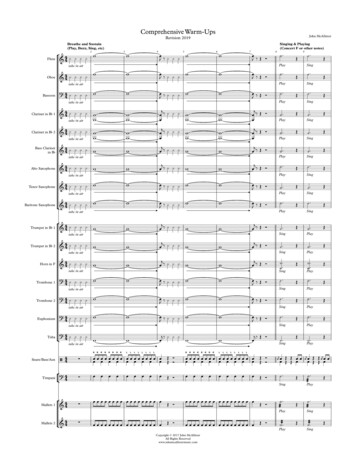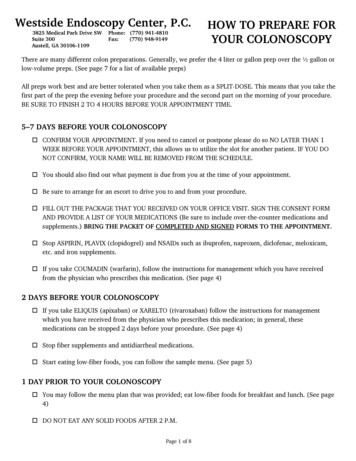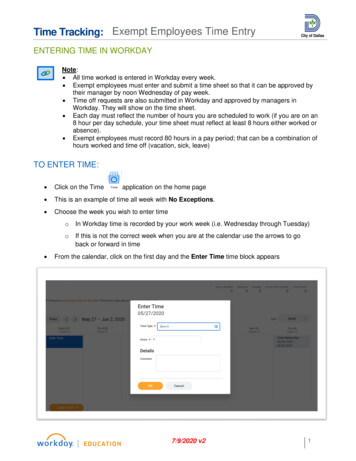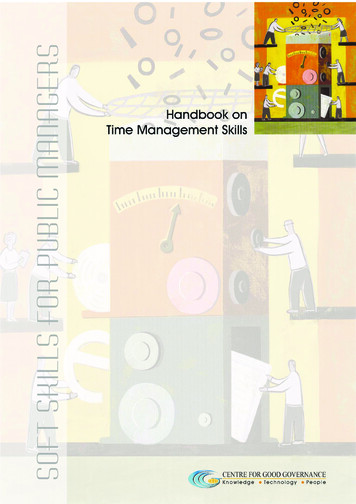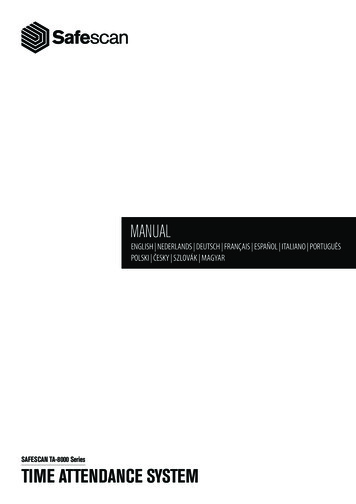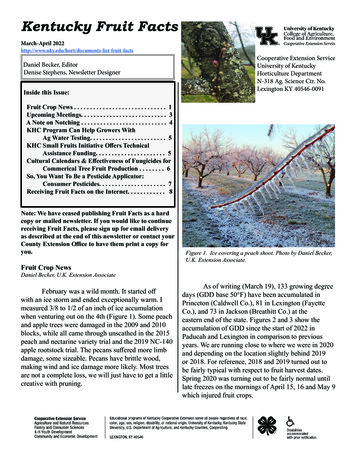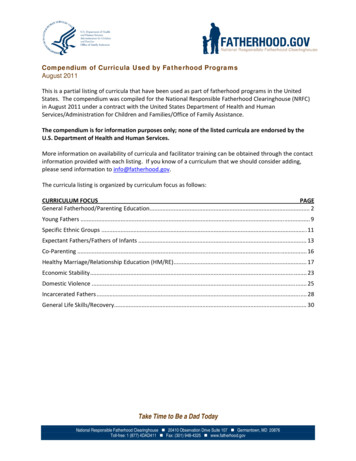
Transcription
Compendium of Curricula Used by Fatherhood ProgramsAugust 2011This is a partial listing of curricula that have been used as part of fatherhood programs in the UnitedStates. The compendium was compiled for the National Responsible Fatherhood Clearinghouse (NRFC)in August 2011 under a contract with the United States Department of Health and HumanServices/Administration for Children and Families/Office of Family Assistance.The compendium is for information purposes only; none of the listed curricula are endorsed by theU.S. Department of Health and Human Services.More information on availability of curricula and facilitator training can be obtained through the contactinformation provided with each listing. If you know of a curriculum that we should consider adding,please send information to info@fatherhood.gov.The curricula listing is organized by curriculum focus as follows:CURRICULUM FOCUSPAGEGeneral Fatherhood/Parenting Education. 2Young Fathers . 9Specific Ethnic Groups . 11Expectant Fathers/Fathers of Infants . 13Co‐Parenting . 16Healthy Marriage/Relationship Education (HM/RE) . 17Economic Stability . 23Domestic Violence . 25Incarcerated Fathers . 28General Life Skills/Recovery . 30Take Time to Be a Dad TodayNational Responsible Fatherhood Clearinghouse 20410 Observation Drive Suite 107 Germantown, MD 20876Toll-free: 1 (877) 4DAD411 Fax: (301) 948-4325 www.fatherhood.gov
Compendium of CurriculaGeneral Fatherhood/Parenting EducationThe 7 Habits of A 24/7 Dad John M.R. Covey (with contributions from Christopher Brown), 2009.Publication Information: FranklinCovey Co. and National Fatherhood Initiative, Germantown, MD.Contact: Erik Vecere, National Fatherhood Initiative, 240‐912‐1278, evecere@fatherhood.org;www.fatherhood.org.The 7 Habits of A 24/7 Dad is an eight‐hour workshop combining the fundamental fathering principlesfrom National Fatherhood Initiative's 24/7 Dad programs (see description below) withFranklinCovey 's 7 Habits. It can be used as a stand‐alone program or as a complement to more in‐depth fatherhood programming. The workshop is designed to encourage fathers to adopt and applyseven helpful habits that will revolutionize their fathering skills and help them connect with their kids.These habits are: Be Proactive; Begin with the End in Mind; Put First Things First; Think Win‐Win; ListenFirst, Talk Second; Synergize; and Sharpen the Saw. A facilitator’s guide, 10 Fathering Guidebooks, and10 Reference Cards for dads are included.Target Population: All fathers.24/7 Dad A.M. and P.M. (2nd edition)Christopher Brown (with contributions from Stephen Bavolek), 2010.Publication Information: National Fatherhood Initiative, Germantown, MD.Contact: Erik Vecere, Vice President of National Programming, 240‐912‐1278, evecere@fatherhood.org;www.fatherhood.org.24/7 Dad includes a basic program (A.M.) and a more in‐depth program (P.M.). Each completeprogram of 12 two‐hour sessions includes a CD‐ROM with pre‐ and post‐assessment instruments,recruitment and marketing tools, and session handouts. The programs can be implemented in group orone‐on‐one home‐based settings. The 24/7 Dad programs are based on a philosophy that supportsthe growth and development of fathers and children as caring, compassionate people who treatthemselves, others, and the environment with respect and dignity. The philosophy is built upon nineprinciples about fathering and parenting that cut across social, racial, and geographic characteristics.More than 1000 individuals representing over 400 organizations have received training andimplemented 24/7 Dad programs. Several evaluation studies have pointed to the effectiveness of thematerials, which have been used with fathers in diverse situations, including: teen dads, urban dads,suburban dads, rural dads, dads in one‐on‐one settings, teens in alternative high schools, and dads inhealthy marriage programs. A facilitator’s manual and 10 Fathering Handbooks are included.Target Population: All fathers.Bringing Back the Dads: A Model Program Curriculum for Non‐Resident Father EngagementLauren Morley, Leslie Wilmot, Jane Berdie, Lara Bruce, and Paul Frankel, 2008.Publication Information: National Quality Improvement Center on Non‐Resident Fathers and the ChildWelfare System, Englewood, CO.Contact: Michelle Howard, 816‐503‐8428, michelleh@americanhumane.org; www.fatherhoodQIC.org.This curriculum is designed to be used to encourage the engagement of non‐resident fathers in the livesof their children. Materials and resources are provided for conducting group sessions with fathers thataddress the following topics: the functions of the child welfare system; service planning in the childwelfare system; ensuring children have a healthy father that makes good life choices; identifying andaccessing resources that are available for families; the role of culture in parenting; child development1 (877) 4DAD411Page 2 of 31www.fatherhood.gov
Compendium of Curriculaand meeting the needs of children; the child welfare visitation process and techniques for havingsuccessful visits; the processes of the juvenile court system, legal advocacy, and court etiquette; childsupport and what is expected of a nonresidential father; shared parenting and recommendations forworking with the child's mother, extended families, and foster parents; and workforce readiness and theimportance of gaining employment. Materials for each session include information on the purpose ofthe session, facilitator preparation, facilitator resources, a list of materials needed for the group session,group activities, and relevant handouts. The curriculum closes with a dictionary of key terms.Target Population: Non‐resident fathers, particularly fathers and families involved with the child welfaresystem.Circle of Parents Facilitator ManualCircle of Parents National Network, 2001 (updated 2004 and 2008).Publication Information: Circle of Parents, Chicago, IL.Contact: Cynthia Savage, 773‐257‐0111, x137, g.The Circle of Parents Facilitator Manual is used by peer support group facilitators and parent leaders astheir guide for conducting Circle of Parents group sessions. It is available in English and Spanish. TheManual outlines best practice for the Circle of Parents’ model, group development, issues that impactthe group, and approaches to developing parent leadership and parenting strategies. The Manual is acompilation of practices from Circle of Parents’ programs across the nation. Facilitators must receivetraining. Circle of Parents’ groups are offered only in states with national Circle of Parents membership.A Parent Handbook, in English and Spanish, is available for each parent attending. A Children’s ProgramManual, in English and Spanish, is available for programs that offer children’s group sessions inconjunction with parent support group meetings.Target Population: Parents and other caregivers of children ages 0‐18 years.Dadventures Erik J. Vecere, 2004.Publication Information: National Fatherhood Initiative, Germantown, MD.Contact: Erik Vecere, Vice President of National Programming, 240‐912‐1278, res includes 18 short activities that can be used as a complement to any fatherhood program.The focus is on activities that elementary school aged kids and dads can do together, with the goal ofconnecting children directly with their dads, while teaching important character traits such as honesty,responsibility, hard work, and generosity. The activities are designed to show dads the important rolethey play in their child’s life. Through fun activities like learning how to use a compass and whistlingwith a blade of grass, dads can learn how to communicate important values to their children, ways tohelp their children develop positive character traits, and ideas for how to spend “quality time” together.There is also a version with activities for dads and preschool kids (Dadventures Pre School) that wasreleased in 2009.Target Population: Dads and their elementary school or preschool children.1 (877) 4DAD411Page 3 of 31www.fatherhood.gov
Compendium of CurriculaFocus on FatheringParents as Teachers, 2008.Publication Information: Parents as Teachers, St. Louis, MO.Contact: Jan Watson, jan.watson@parentsasteachers.org; www.parentsasteachers.org.Focus on Fathering is a facilitated group meeting curriculum designed for dads. While the Fathers forLife project, for which the curriculum was created, is designed for families whose fathers areincarcerated or on probation or parole, Focus on Fathering is designed to be used with all fathers. Thecurriculum contains 12 facilitated group meeting plans on topics such as Child Development, Connectingwith your Child, Discipline, Healthy Relationships, Parenting Apart, Reading with Your Child, Self‐Esteem,Ways to Play, etc. These group meeting plans contain educator resources and specially designedhandouts for fathers. The information can be used outside of the group meeting format, such as innewsletters, personal visits, and other activities. This curriculum is being offered to early childhood andparent education professionals at no cost to them or their programs. The intent is to disseminate thecurriculum as broadly as possible. It is available for free download.Target Population: All fathers.The Nurturing Fathers ProgramMark Perlman, 1998.Publication Information: Center for Growth & Development, Inc., Sarasota, FL.Contact: Mark Perlman, 941‐953‐9556, mcperl@verizon.net; www.nurturingfathers.com.The Nurturing Fathers Program (NFP) is a 13‐week training course designed to teach parenting andnurturing skills to men. The program is adapted from and listed as an approved model derived fromStephen Bavolek’s Nurturing Parenting Programs (see www.nurturingparenting.com). NFP is structuredon an experiential learning model to provide fathers with experiences that allow for new cognitive(thinking) and affective (feelings) responses in order to provide the opportunity to change parentingattitudes and behaviors, and develop more nurturing, rewarding relationships with children,spouses/co‐parents, and other family members. Topics covered include: the roots of fathering, self‐nurturing skills, male nurturance, fathering without violence or fear, fun and games for fathers andchildren, communication and conflict resolution, and teamwork with spouse/co‐parent. Each 2 ½ hourclass provides proven, effective skills for healthy family relationships and child development. NFP hasbeen successfully implemented in schools; Head Start; churches; state DSS; prisons; halfway houses;prevent child abuse, parenting, and counseling centers; military; community action agencies; and manyothers. Facilitator manuals and father’s journal/workbooks are included, along with additionalmaterials. A 10‐week adaptation titled MArriage & PArenting Program (MA&PA) is designed for workwith couples (married or unmarried).Available in English and Spanish.Target Population: All fathers.The Nurturing Parenting Programs Stephen Bavolek, 1983.Publication Information: Family Development Resources, Inc., Asheville, NC.Contact: Family Development Resources, 800‐688‐5822, .com.The Nurturing Parenting Programs (NPPs) are family‐based programs for the prevention and treatmentof child abuse and neglect. The programs were developed to help families who have been identified bychild welfare agencies for past child abuse and neglect or who are at high risk for child abuse andneglect. The first Nurturing Parenting Program was developed and validated in 1983 through a federal1 (877) 4DAD411Page 4 of 31www.fatherhood.gov
Compendium of Curriculagrant from the National Institute for Mental Health (NIMH). The data showed that 80 of the 100 familiescompleted the 15‐week program with significant pre‐ and post‐test improvements and longitudinalfollow up found a recidivism rate of only 7% compared to a national average of 35% to 80%. There arenow a large variety of “Nurturing” curricula and support materials available for various age groups andfamily situations. Based on psycho‐educational and cognitive‐behavioral approaches to learning, thefocus is the development of awareness, knowledge and skills in five areas: (1) age‐appropriateexpectations; (2) empathy, bonding, and attachment; (3) nonviolent nurturing discipline; (4) self‐awareness and self‐worth; and (5) empowerment, autonomy, and healthy independence.Target Population: Originally developed for work with families at risk for child abuse or neglect;applicable for all fathers.Positive Parenting: Tips on FatheringChildren's Trust Fund, 1996.Publication Information: Children's Trust Fund, Madison, WI.Contact: Children's Trust Fund, 608‐266‐6871.This manual provides a model curriculum and resource materials for parenting education programs forfathers. The material focuses particularly on the interests and learning styles of men. Eight workshopsessions are described: fathering, playing, disciplining, listening, building, exploring, growing, andcelebrating. Background information for facilitators provides: an explanation of the importance offathers in the lives of their children, information on how to create father‐friendly environments,information on child development from newborn to three years old, recipes, and ideas for projects andactivities. Reading suggestions and handouts about child safety are also included.Target Population: All fathers.Preparing for Successful FatherhoodRon Klinger, 2004.Publication Information: Center for Successful Fathering, Austin, TX (now distributed through the City ofBryan, TX).Contact: Ronnie Jackson, 979‐209‐5115, rjackson@bryantx.gov.Preparing for Successful Fatherhood (PSF) has been used by school districts and Head Start programs inmore than 20 states for work with fathers of all races and income levels. PSF is a curriculum for fathersof children from birth to age six, with a focus on the theory and practical applications of how to be anengaged and involved father, and is provided in a workbook format that includes case studies,interactive activities, and exercises. Information is presented in a variety of learning styles to reach anyparent. There are 10 chapters addressing topics such as the role of a father, differences in male andfemale parenting styles, bonding through play, father as role model, solo time with your child, amother’s influence on fathering, the challenges of co‐parenting, and tips for new dads. PSF operatesunder the theory that helping dads connect with their children helps them grow and mature as an adult.Fathers and mothers who complete the program typically become more involved and invested parentswhich increases their commitment to things like paying child support, spending quality time with theirchildren, and shared decision making. A Spanish language version (Paternidad Exitosa) is available.Target Population: Fathers and father‐figures of children from birth to age six.1 (877) 4DAD411Page 5 of 31www.fatherhood.gov
Compendium of CurriculaQuenching the Father Thirst: Developing a DadGeorge R. Williams, 2003.Publication Information: National Center for Fathering, Shawnee Mission, KS.Contact: National Center for Fathering, 913‐384‐4661, 800‐593‐DADS, dads@fathers.com;www.fathers.com.Quenching the Father Thirst: Developing a Dad is a curriculum developed by the National Center forFathering to train men to become responsible fathers/father figures that love, know, and guide theirchildren to success. This research and theory‐based curriculum is designed to be useful for fathers inany social service based setting (e.g., courts, prisons, employment agencies, hospitals, drugrehabilitation centers) and in any fathering situation (e.g., teen, single, married, divorced, non‐custodial,step, father‐figures). It is a tool to transform the dysfunctional father into a functioning father and thefunctioning father into a higher functioning father. The curriculum was designed to provide aframework for understanding the role of the father, address the systemic barriers to fathering, andprovide training in specific skills to become the father his child needs.Target Population: All fathers.The Responsible Fatherhood Curriculum: A Curriculum Developed for the Parents' Fair ShareDemonstration.Eileen Hayes and Kay Sherwood, 2000.Publication Information: Manpower Demonstration Research Corporation (MDRC), New York, NY.Contact: MDRC, 212‐532‐3200, information@mdrc.org; www.mdrc.org.Although intended for use in a wide range of support groups, this curriculum was developed as part of aspecific project: the Parents’ Fair Share (PFS) Demonstration, which targeted unemployed non‐custodialfathers of children on welfare, with the goal of increasing earnings and child support payments,improving their parenting and communication skills, and providing an opportunity for them toparticipate more fully and effectively in the lives of their children. Adapted from FatherhoodDevelopment, which was developed by Public/Private Ventures for the Young Unwed Fathers PilotProject, Responsible Fatherhood was field‐tested in the PFS Demonstration in the mid 1990s and thenrefined, revised, and retooled with input, guidance, and feedback from peer support facilitators in eachof the PFS sites. Over the course of eight years, activities that promised to be helpful were added andthose that were not as effective were discarded. The 18 sessions address the rights and responsibilitiesof noncustodial fathers; child development and behavior; coping skills; anger management; andrelationships with friends, partners, and coworkers. Other issues covered include racism, time andmoney management, and support networks. The manual includes guidelines for facilitators and tips formodifying the curriculum and managing peer support groups. Free download.Target Population: All fathers.Strength Training for Strong FathersJ. Michael Hall, 2008.Publication Information: Strong Fathers‐Strong Families, LLC, Fort Worth, TX.Contact Information: Mike Hall, 817‐301‐4086, mikehall@strongfathers.com; www.strongfathers.com.Strength Training for Strong Fathers is a 10‐week program for court‐ordered fathers as well as teenfathers, incarcerated fathers, and other fathers in the community. Strength Training for Strong Fathersis based on the premise that men learn best when they are respectfully guided through an activeprocess. Consequently, there are many opportunities for the men to speak and to share theirknowledge and experience. The curriculum is based on a “masculine model” that men respond to andincludes activities that are interactive, relational, and pragmatic. The program is divided into three1 (877) 4DAD411Page 6 of 31www.fatherhood.gov
Compendium of Curriculasections: 1) Where You Have Been (Dealing with Feelings, Shifting Your Strength Training for StrongFathers, Reflecting on Your Father); 2) Strength Assessment (Identifying the Roles of a Man, Valuing YourRole as a Father, Uniting the Roles); and 3) Planning & Implementation (Creating a Plan, Building aStronger Kid, Leaving Your Imprint, Putting Your Plan into Action). The curriculum goals are to benefitchildren by increasing their fathers’ emotional and financial support; strengthen co‐parentingrelationships; and promote fathers’ parenting skills.Target Population: Court ordered fathers, teen fathers, incarcerated and formerly incarcerated fathers,fathers involved with CPS, military fathers.Strengthening Families ProgramKarol Kumpfer, 1982.Publication Information: University of Utah, Department of Health Promotion and Education, Salt LakeCity, UT. Now available from the Strengthening Families Program (SFP).Contact: Henry Whiteside, 801‐583‐4601, sprogram.org. For information about American Indian SFP, contact CeceiliaTso, 801‐577‐2668, ctso2001@yahoo.com.The Strengthening Families Program (SFP) is a 14‐session parenting skills, children's life skills, and familylife skills training program specifically designed for high‐risk families. SFP was designed in 14 sessions toassure sufficient dosage to promote behavior change in high risk families and has been implemented inschools, drug treatment centers, family and youth service agencies, child protection and foster careagencies, community mental health centers, housing projects, homeless shelters, churches, and drugcourts and prisons. The parenting sessions review appropriate developmental expectations and teachparents to interact positively with children (e.g., showing enthusiasm and attention for good behavior,letting the child take the lead in play activities, increasing attention and praise for positive behaviors,active listening, reducing criticism and sarcasm, and effective and consistent discipline). SFP is culturallysensitive rather than culturally specific, but has been successfully adapted for African American,Asian/Pacific Islander, Hispanic, and American Indian families, and has been translated into Spanish,Portuguese, Russian, Dutch, Swedish, French, Thai, and Chinese. A cultural adaptation protocol has beendeveloped and published. Group Leader Manuals and Participant Handbooks/Handouts are provided.Target Population: Fathers in high risk families.Strong Fathers‐Strong SchoolsJ. Michael Hall, 2008.Publication Information: Strong Fathers‐Strong Families, LLC, Fort Worth, TX.Contact Information: Mike Hall, 817‐301‐4086, mikehall@strongfathers.com; www.strongfathers.com.Strong Fathers‐Strong Schools is a father‐involvement curriculum to help educational organizationsimprove father‐child connections, increase fathering skills, and promote positive student outcomes.Strong Fathers‐Strong Schools is an event based program that reaches fathers where the children learn.These events have been provided to over 100,000 fathers with great success and they impact the father,the child, and the communities in which they reside. By working with schools and Head Start programs,facilitators can reach substantially more fathers in an established entity with a vested interest in thelives of children. The program prescribes three to five events each school year. The most effectiveevents have been 1) Bring Your Dad to School (activity with dads in classrooms to teach them about theimportant role they play in their child’s education); 2) Dad and Kid Science Night (interactive scienceactivities that help fathers and children bond through mutual discovery and play); 3) Dad and Kid MathNight or Math Morning (interactive math games to strengthen father‐child interactions and math skills);1 (877) 4DAD411Page 7 of 31www.fatherhood.gov
Compendium of Curriculaand 4) Dad and Kid Reading Night (interactive reading activities that teach fathers the skills andimportance of masculine reading).Target Population: Fathers and their young children.Teaching Important Parenting Skills: TIPS for Great Kids!Patti Bokony, 2011.Publication Information: University of Arkansas for Medical Sciences, Little Rock, AR.Contact: Teri Patrick, patrickterese@uams.edu; www.psychiatry.uams.edu/tips.The University of Arkansas for Medical Sciences developed Teaching Important Parenting Skills: TIPS forGreat Kids! as an innovative way to deliver parenting information. The TIPS toolkit, which can be used asan alternative to parenting classes or incorporated into group sessions, provides research‐basedparenting information in a format that allows social service programs to incorporate parenting skills andinformation into their existing services. Over 250 parenting tips are presented on 4” x 6” parenting tipcards covering topics of interest to parents of infants, toddlers, and preschoolers. Topics are organizedinto 12 domains that research has shown to be important for child well‐being. TIPS can be feasiblyimplemented in early childhood education settings. Teachers and teacher assistants gain knowledge andskill in child development and building positive relationships with parents so that family risk factorsmight decrease over time.Target Population: Fathers of infants, toddlers, and preschoolers; applicable for all fathers.1 (877) 4DAD411Page 8 of 31www.fatherhood.gov
Compendium of CurriculaYoung Fathers(NOTE: while the curricula listed here were all originally developed for work with young fathers, most ofthem do contain material that can be used with older fathers, too.)Fatherhood Development: A Curriculum for Young FathersPamela Wilson and Jeffery Johnson, 1991.Publication Information: Public/Private Ventures (P/PV), Philadelphia, PA. Now distributed throughNational Partnership for Community Leadership (NPCL).Contact: Jeffrey Johnson, NPCL, 202‐234‐6725, jjohnson@npcl.org; www.npclstrongfamilies.com.Developed by P/PV for use in the Young Unwed Fathers Pilot Project (1991‐93), FatherhoodDevelopment is based on real experiences and challenges of fathers in fragile family settings. Through25 streetwise group discussion sessions, the curriculum offers practitioners a field‐tested guide toworking with fathers in providing support, information, and motivation in areas of life skills, parenthood,relationships (including marriage and team parenting), and health. The curriculum also offers amethodology for training and learning as well as a set of assessment tools. Several practitioners havedescribed it as the “glue” that makes their programs work. Recognizing that people have differentlearning styles, the curriculum uses a variety of approaches (e.g., mini‐lectures, brainstorming, smallgroup discussion, competitive team activities, role‐playing). The activities are designed to utilize the“experiential learning cycle” approach to ensure that all participants fully process and assimilate keyideas and develop strategies to apply them in their daily lives. Field‐tested with African‐American,Hispanic, and Caucasian fathers. Used in a wide variety of program settings.Target Population: Young, primarily unwed, low‐income fathers aged 16‐25; applicable for work witholder fathers.ROAD to Fatherhood: How to Help Young Dads Become Loving and Responsible Parents.Jon Morris, 2002.Publication Information: Morning Glory Press, Buena Park, CA.Contact: Morning Glory Press, 888‐612‐8254, om.ROAD to Fatherhood is designed to help organizations develop and deliver comprehensive services foryoung fathers. The many needs of young fathers are explored through their real stories, together withstrategies for helping them meet their individual and unique challenges. The book also helpsorganizations in the following areas: 1) Plan before you start your program; 2) Choose qualified andempathetic staff; 3) Recruit young fathers; 4) Evaluate curriculum; 5) Promote your services; and 6)Celebrate each father's love for his child.Target Population: Young fathers.Young Dads/Young Moms: A Curriculum for Facilitated Group MeetingsParents as Teachers, 2007.Publication Information: Parents as Teachers, St. Louis, MO.Contact: Jan Watson, jan.watson@parentsasteachers.org; www.parentsasteachers.org.Adapted from the original MELD Young Dads & MELD Young Moms curriculum, this 850‐page curriculumhas strengthening families’ protective factors woven throughout. The materials include facilitatorresources, detailed group meeting plans and activities to make it easy to engage young people. Dadsreceive special focus, not just in the meeting plans for dads but also in material for moms. Five units1 (877) 4DAD411Page 9 of 31www.fatherhood.gov
Compendium of Curriculaaddress topics in the areas of personal development, health and safety, parenting skills, childdevelopment, and using community resources.Target Population: Young fathers and mothers.Young Fathers Video and Workshop GuidePublic/Private Ventures (P/PV), 2007.Publication Information: Public/Private Ventures, Philadelphia, PA.Contact: 215‐557‐4400, publications@ppv.org; www.ppv.org.This DVD and workshop guide are designed to be used with young parents or teens who are not yetparents. The DVD features a 28‐minute documentary on young fathers and seven teachable momentclips from the film that are one to seven minutes each. The documentary focuses on two young fathersand highlights the needs and circumstances of many low‐income fathers, including those who have beeninvolved with the criminal justice system. It addresses the challenges of early parenthood, the role offathers in their children's lives, the need to build solid co‐parenting relationships, and attitudes aboutchild support and marriage. The DVD also includes information about the Fathers at Work initiative andthe film. An accompanying CD features downloadable discus
The 7 Habits of A 24/7 Dad is an eight‐hour workshop combining the fundamental fathering principles from National Fatherhood Initiative's 24/7 Dad programs (see description below) with FranklinCovey 's 7 Habi

